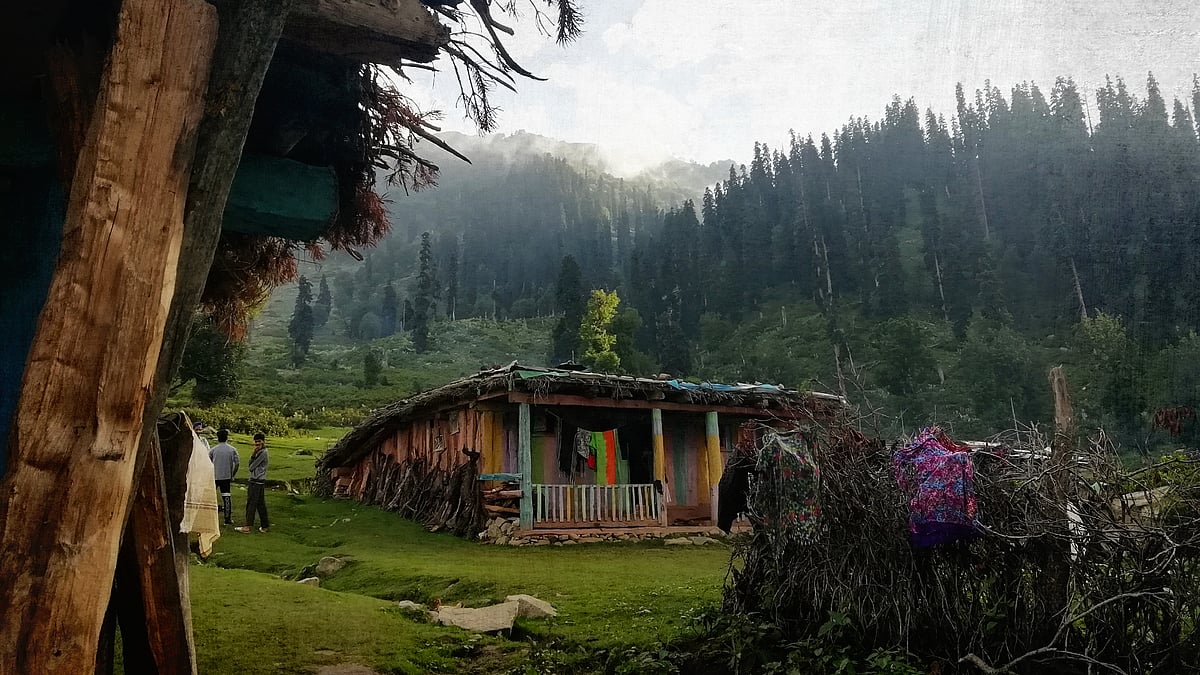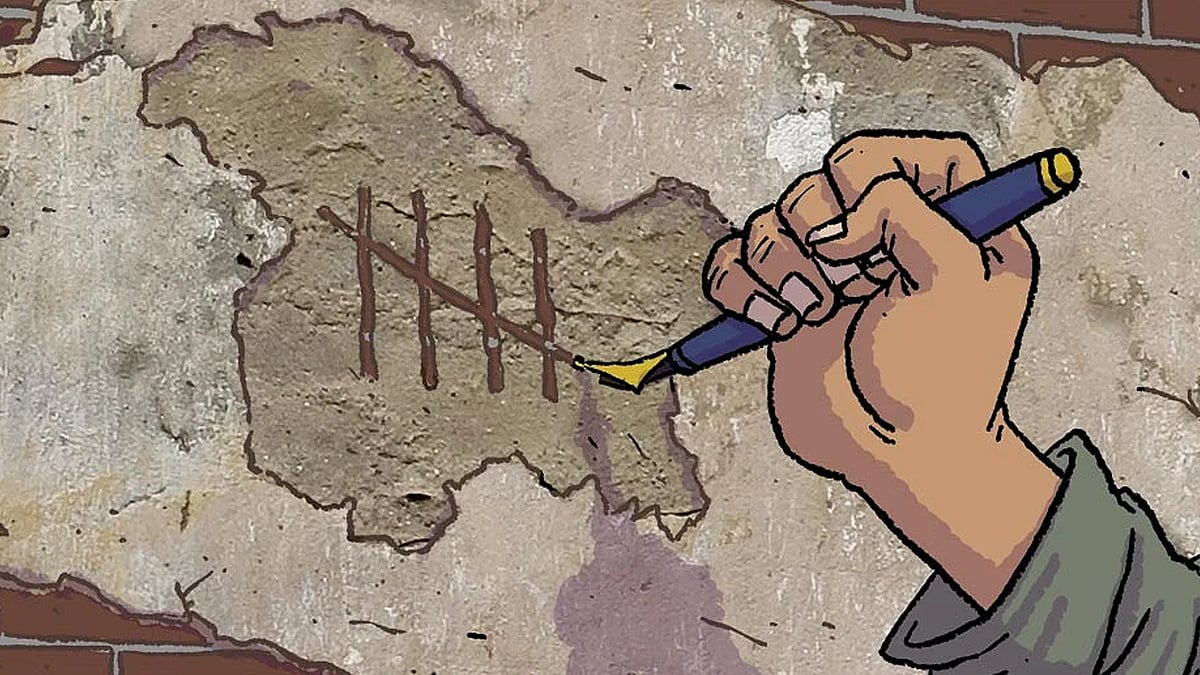Kashmiri nonprofit sets up oxygen facility, babus steal the credit. Why?
A network of local nonprofits is working round the clock to provide Covid relief, and the unelected administration is desperate for credit.
Kashmiris breathed a sigh of relief when an oxygen support facility with 100 beds for Covid patients was reported to be operational on May 5. Not least because it came up as coronavirus infections were rising in the valley and horrifying visuals were emerging of people dying for want of oxygen at overwhelmed Indian hospitals.
Green vinyl banners strung above the entrance to the facility, now christened “Oxygen Sarai”, declared it to be an initiative by the District Disaster Management Authority and Athrout, a local nonprofit.
When Kashmir’s divisional commissioner, Pandurang Pole, visited the facility on May 6, he was seen taking stock as Athrout’s volunteers, dressed in green jackets, stood closeby. But while briefing the press later, Pole merely acknowledged that “an NGO” had provided equipment for the facility, set up inside the Haj House, a three-storey building in Srinagar used once a year as a processing area for Haj pilgrims.
By May 8, Athrout was removed from the picture completely. A statement released by the information and public relations department announced that the government had set up a “100-bedded oxygenated facility at Haj House” in a week’s time. The statement did not so much as mention the NGO.
A day later, the green banners mentioning Athrout were gone. As were the customary green jackets of the NGO’s volunteers at the facility.
Thus, in a matter of days after Athrout reportedly launched the facility, without a top official surrounded by cameras cutting ribbons, the nonprofit became anathema for the Jammu and Kashmir administration.
As a result, what could have been an example of a successful state partnership with civil society in a region where mistrust of the administration runs deep has become a major point of contention over, perhaps, a matter of prestige.
Desperate for credit
Athrout set up the facility in just three days with the help of the DDMA, headed by Srinagar district magistrate Ajaz Asad. The collaboration was proceeding well until a media report announced its opening, according to a source at the facility. “Kashmir Charity Group Athrout Converts Haj House into 100-bed Covid Centre within 3 Days,” the News18 report stated.
That’s when, as the source put it, “the mood changed from the government’s side”. Government officials were upset, he explained, that they weren’t given enough credit for the initiative.
So, the source who spoke on the condition of anonymity said, Athrout’s volunteers were reprimanded for speaking to the press, told to pull down the banners, and even remove their jackets.
The May 8 statement also announced that “more oxygenated beds shall be established” as per directions of the lieutenant governor “to further strengthen the oxygen support system in Srinagar district”.
In the absence of an elected government led by a politician, advertisements in Jammu and Kashmir are plastered with mugshots of the lieutenant governor, Manoj Sinha, a BJP leader from Uttar Pradesh.
The administration has been without local political oversight since 2018, when the last government was felled by the BJP, leaving the top bureaucrats, most of them non-Kashmiris, to run the show. Since the removal of the last vestiges of Kashmir’s autonomy in August 2019, the bureaucratic administration has further consolidated their stranglehold on the region and sought to undermine the need for political oversight, as is evident in its media campaign through the public relations department.
Its handout on the “Oxygen Sarai” – sarai means a resting place – was faithfully carried by local newspapers Kashmir Observer, Kashmir Monitor, Rising Kashmir, and Daily Excelsior. None even tweaked the headline or mentioned Athrout, even as some of them have carried separate stories acknowledging the nonprofit’s role.
In April last year, Athrout had donated six ventilators to the Chest Diseases Hospital in Srinagar, but they were returned within a day allegedly on the J&K administration’s direction. Bureaucrats were reportedly miffed at news reports noting the administration had accepted help from a local nonprofit. Then as now, the J&K administration was desperate for credit.
Bilal Khan, a member of Athrout who oversaw the setting up of the oxygen facility and was quoted in the News18 report, wouldn’t comment on why the administration had sidelined his nonprofit. Asad, the district magistrate, didn’t respond to a request for comment.
The Oxygen Sarai is a rare preemptive step to tackle the devastating second wave of the pandemic as hospitals in Kashmir aren’t yet overwhelmed. In the days after it was set up, the source at the facility said, officials from several hospitals visited the facility to learn its innovative ways to speed up the installation of oxygen capacity, otherwise a simple procedure.
The initiative was said to have been mimicked by a Srinagar businessman who claimed to have set up a facility with 200 beds and oxygen concentrators. But news reports featuring the businessman didn’t show any concentrators at the facility. Same holds true for a facility set up by the Srinagar Municipal Corporation.
Kashmir doesn’t have a robust public healthcare system, with most of the tertiary care facilities concentrated in the capital Srinagar, a city of over a million people and 10,000 Covid cases. As on May 14, J&K officially had more than 50,000 active Covid cases while more than 3,000 people had died.

Panicked administration says don't panic
On April 29, the bureaucratic administration called an urgent press conference in the evening to, ironically, urge the public not to panic. Addressing the media, Baseer Khan, a former bureaucrat who serves as one of the lieutenant governor’s advisors, asserted that the administration was prepared to deal with the Covid situation.
“I want to make it clear that nobody will face hardships in terms of oxygen and related things,” the advisor declared.
Two weeks on, SOS messages by Kashmiris looking for ICU beds, oxygen and medicines for Covid patients continue to flood social media.
The gap is being bridged by a robust network of local nonprofits working tirelessly round the clock. Besides Athrout, notable local nonprofits working on the ground include the Social Reform Organisation and the Help Poor Voluntary Trust.
These nonprofits have also provided a large number of Covid patients with oxygen cylinders, concentrators, and life saving medication, free of cost. Yet, on May 6, the administration banned NGOs from refilling oxygen cylinders. The ban was seen as a strategy to hamper the efforts of nonprofits whose service and accessibility have made them indispensable, even to doctors at one of Kashmir’s main Covid care hospitals. This move is of a pattern.
In October 2020, Athrout was among the nonprofits raided by the National Investigation Agency in Kashmir. The NIA alleged the raids were conducted “on receipt of credible information that certain NGOs and trusts are collecting funds domestically and abroad through so-called donations and business contributions etc and are then utilizing these funds for secessionist and terrorist activities in J&K”.
The nonprofits, however, remain undeterred. In the broader interest of serving their society it seems that nonprofits like Athrout have adopted a Gandhian policy – if they are slapped by the administration, they merely present their other cheek.
 Kashmir: Why have babus and BJP reversed course on scrapping Roshni scheme?
Kashmir: Why have babus and BJP reversed course on scrapping Roshni scheme? ‘Sarkari bulletin’: How the Indian state has used fear and ad money to hollow out Kashmir’s press
‘Sarkari bulletin’: How the Indian state has used fear and ad money to hollow out Kashmir’s press